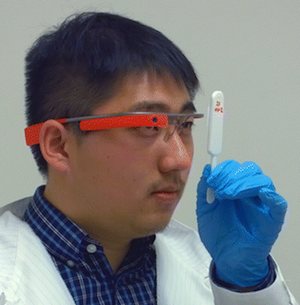Experts at the University of California, Los Angeles, have developed a Google Glass app that they claim could help stop emerging public health threats around the world.
Glass is a pioneering "wearable computer" designed by the software and computing corporation Google. It takes the form of a pair of eyeglasses with a small transparent computer screen in the right eye and a touchpad built into the right arm of the frame.
Recently launched to consumers, Google Glass has already received a large amount of hype from tech optimists, as well as criticism on privacy issues caused by the headset's mounted video camera.
Only today, the first "Google Glass hate crime" was reported when a technology journalist was assaulted in a San Francisco bar, allegedly over her use of the device.
Meanwhile, health care professionals are exploring the medical applications of Google Glass.
Recently, Medical News Today reported on surgeons using Google Glass while operating. The surgeons involved think that Google Glass is useful for live-streaming procedures - which could provide better training for students - and communicating directly from the operating room with a patient's loved ones.
They also think that being able to view MRI (magnetic resonance imaging) and X-ray results on the Glass screen will be beneficial to surgeons while operating.
An Australian technology company has also developed a Google Glass app to help mothers breastfeed.
New app uses QR codes to relay diagnostic data

By translating QR codes on medical tests, the new app returns correct diagnoses to the user within 8 seconds.
Image credit: ACS Nano
The new app developed by the University of California uses Glass' built-in camera to take a picture of a type of diagnostic test called a "lateral flow immunochromatographic assay."
Custom-created QR (also known as "Quick-Response") codes on the test strips are relayed by Glass to more powerful computers in other parts of the world, which then quickly return a diagnosis to the user.
The team successfully piloted their app using HIV and prostate-specific antigen (PSA) assays. They found that, even when taking one picture of several test strips next to each other, the app could still return correct diagnoses within 8 seconds.
If no wi-fi is available, then it is still possible to use the app by hooking Glass up to a smartphone with an internet connection.
The developers, who publish the results of their research in the journal ACS Nano, believe that the data collected by the app could help researchers track the spread of diseases around the world.
"It's very important to detect emerging public health threats early, before an epidemic arises and many lives are lost," says Aydogan Ozcan, PhD.
He adds:
"With our app for Google Glass and our remote computing and data analysis power, we can deliver a one-two punch - provide quantified biomedical test results for individual patients, plus analyze all those data to determine whether an outbreak is imminent."
No comments:
Post a Comment